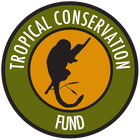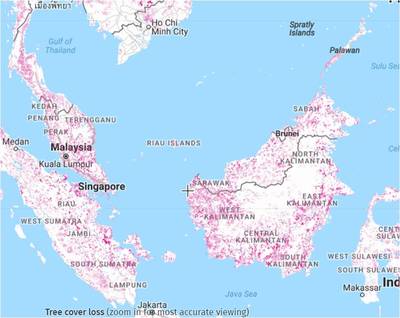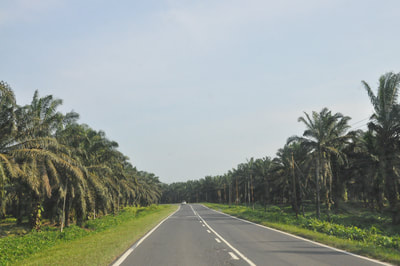You probably consumed palm oil today which indirectly impacted the health of wildlife and tropical forests throughout the world. Palm oil is literally everywhere – in our foods, cosmetics, cleaning products and fuels. Found in cookies, crackers, frozen dinners, shampoo, lotions, cosmetics, pet food, and many other products, palm oil is now the most widely produced edible oil. It is also found in a wide array of products sold in natural food stores, and it is being used as a possible fuel alternative. See what companies are heavily invested in palm oil production. It’s a source of huge profits for multinational corporations, while at the same time destroying the livelihoods of smallholders. Displacement of indigenous peoples, deforestation and loss of biodiversity are all consequences of our palm oil consumption.
Unfortunately, palm oil and beef production are the leading causes of deforestation throughout the world. Palm oil is derived from the oil palm tree (Elaeis guineensis), which is native to West Africa and grows best in tropical climates with abundant water. Three-quarters of total palm oil produced is used for food, particularly cooking oil and processed oils and fats. It is also used in cosmetics, cleaning products and biofuel.
The production of palm oil comes at a hefty cost. In order to meet demand, plantations convert vast amounts of land where rainforests once stood–meaning a loss of biodiversity and habitat for thousands of species. The human cost is no less with land being seized from indigenous communities to grow more palm trees, and workers are routinely exploited throughout the industrial process. The establishment of vast monoculture oil palm plantations has a number of environmental impacts.
The two most serious are:
Unfortunately, palm oil and beef production are the leading causes of deforestation throughout the world. Palm oil is derived from the oil palm tree (Elaeis guineensis), which is native to West Africa and grows best in tropical climates with abundant water. Three-quarters of total palm oil produced is used for food, particularly cooking oil and processed oils and fats. It is also used in cosmetics, cleaning products and biofuel.
The production of palm oil comes at a hefty cost. In order to meet demand, plantations convert vast amounts of land where rainforests once stood–meaning a loss of biodiversity and habitat for thousands of species. The human cost is no less with land being seized from indigenous communities to grow more palm trees, and workers are routinely exploited throughout the industrial process. The establishment of vast monoculture oil palm plantations has a number of environmental impacts.
The two most serious are:
- large-scale forest conversion
- loss of critical habitat for endangered species
- soil erosion
- air pollution
- soil & water pollution
- climate change
These environmental impacts are now well-known, but with an estimated half of consumer goods containing palm oil, how can we start to reduce our dependency on this destructive practice?
- 1. If possible, don't consume palm oil or at the very least only consume products with sustainably obtained palm oil. Read labels. Check whether companies are doing their part to remove palm oil from their products. This is obviously difficult because most packaging is misleading and palm oil is found in most packaged food and cosmetics. Also, you will need to use different apps to ascertain whether the palm-oil was sourced sustainably. However, you can download apps which grade companies on their sustainability (http://palmoilscorecard.panda.org/ and https://www.spott.org/palm-oil-resource-archive/shopping/). The problem is that many companies mislead consumers on whether products contain palm oil, and they often don't meet their sustainability goals.
- 2. Find alternatives (for example: http://www.ethicalconsumer.org/shoppingethically/palmoilfreelist.aspx). Also see below for specifics related to commonly used products. For example, most packaged food contains palm oil; however some companies are purposefully not using palm oil or are part of sustainable consortiums. WWF has a useful (though not complete) app which can search for products and companies who they grade on sustainability.
- 3. Write companies and demand they take action to preserve these valuable tropical forests (see WWF scorecard at http://palmoilscorecard.panda.org/. Ask your retailers for palm oil-free products. Write product manufacturers and ask them why they aren’t using domestic oils. Companies can be quite sensitive to issues that give their products a bad name, so inquiring with sales staff and contacting manufacturers can make a real difference. Public pressure and increased awareness of the problem have already prompted some producers to stop using palm oil.
- 4. Unfortunately, in our demand for biofuels, many countries are importing palm oil to meet demand. Leave your car at home: Whenever you can, walk, ride a bicycle or use public transport. Europe is currently trying to ban palm oil imports.
- 5. Write your politicians and demand they support actions to preserve tropical forests and demand that companies provide fair labeling about palm oil use. Protest marches and creative action on the street raise public and media awareness of the issue, which in turn steps up the pressure on policymakers.
- 6. Donate to groups and agencies working to reduce palm oil impacts. It should be noted that the name sustainable palm oil is potentially dubious as wildlife doesn't do well in any type of palm oil plantations, and those groups regulating sustainable palm oil are failing to address the concerning and harmful practices of many palm oil companies it certifies as socially and environmentally ethical. Using nine case studies as evidence, the report makes claims that RSPO auditors have failed to identify and address Indigenous land rights in areas where they have certified palm oil plantations, as well as failing to identify situations where companies are using trafficked labor, razed forests of High Conservation Value, and destroyed crucial animal habitats. Other examples include enforcement problems in Liberia. With that said, these groups are trying to limit the impact of palm oil plantations on wildlife and habitat.
- Roundtable on Sustainable Palm Oil. Roundtable on Sustainable Palm Oil (RSPO) is a not-for-profit that has set that standard on what it means to be certified sustainable palm oil (CSPO). They develop and implement the global standards for sustainable palm oil and in order for any company to become CSPO certified they must comply with all environmental and social standards. Currently, the RSPO has 1,700 certified members and growing. In 2013, WWF took an active role in the principles and criteria implemented by the RSPO and pushed for changes and tighter restrictions. While there has been some debate over whether RSPO certifications are effective, their work is helping to raise awareness that sustainable supply chains are possible, but it is up to individual companies to ensure they are accountable for what they claim to be achieving. Evaluating the effectiveness of palm oil certification in delivering multiple sustainability objectives. Unfortunately, it's currently the only mechanism that allows consumers to have some sense of which palm oil plantations are remotely sustainable.
- Palm Oil Innovation Group. The POIG was formed thanks to the help of WWF in 2013. It aims to implement the RSPO standards and transform the palm oil industry by discovering more sustainable ways of sourcing for palm oil and advocating for those methods. The POIG also acts as a platform for producers and members to voice their thoughts and engage in conversations that can bring about a positive change in the industry.
- Rainforest Rescue. The Rainforest Rescue is a non-profit dedicated to preserving and protecting rainforests and the wildlife that inhabit them. To do this, they purchase large areas of rainforest through donations and also restore areas of the rainforest that have been destroyed. The Orangutan habitat restoration project in North Sumatra is currently busy planting native rainforest plant species in areas that have been destroyed due palm oil deforestation. Rainforest Rescue also runs campaigns to raise consumer awareness about palm oil to help lower the global demand for this good.
- Rainforest Action Network (RAN). RAN encourages non-violent direct action from all of its supporters as they campaign for the environment and its inhabitants. In September of 2014, RAN and 3,000 supporters shut down Wall St. as part of their Flood Wall Street campaign in an effort to bring attention to the role major corporations and banks have had on the global climate crisis. Last year they launched their campaign to cut palm oil from America’s snack foods; you can sign the petition here urging companies to follow suit.
- WWF. WWF is dedicated to finding a sustainable way to source palm oil and has been actively encouraging companies to use only RSPO certified palm oil in their products. In 2009 and again in 2011, WWF graded major retailers and manufacturers in four distinct areas to determine if they were practicing sustainable sourcing.
- Orangutan Conservancy. The mission of the Orangutan Conservancy is to protect the wild orangutans living in Borneo and Sumatra and ensure their future survival. The Orangutan Conservancy allows supporters to donate to the cause in a number of ways and has plenty of informative articles on the site; including information on palm oil plantations and products to avoid that are ultimately aiding in the deforestation and destruction of the orangutans habitat.
- Rainforest Trust. Rainforest Trust raises money through different projects and uses those donations to help purchase land before it’s purchased by other companies. They educate locals on the damage caused by palm oil production and provide them with economic assistance to ensure that they will continue to be stewards for the land (rather than succumbing to pressure from the palm oil industry). One of their projects achieved its goal of raising 1.5 million dollars, that money will aid in purchasing more land and protecting prime orangutan habitat in the Kerauk Forest Reserve and Lower Kinabatangan Wildlife Sanctuary region.
- Palm Oil Action. Palm Oil Action is a group of non-government organizations that educate and bring awareness to the palm oil plantation development in Indonesia Malaysia and Papua New Guinea. Based out of Australia, two of their current campaigns involve pressuring the Australian government to label products containing palm oil and call for one of the nation’s largest supermarket chain to use only certified sustainable palm oil.
- Sumatran Orangutan Society (SOS). The Sumatran Orangutan Society raises money through donations to help restore damaged orangutan habitat including land in the Gunung Leuser National Park. Their campaigns educate and encourage locals to get involved, including the farmers who often find themselves in the middle of a human-wildlife conflict. Orangutans are often forced into farmland after their habitats are destroyed; the SOS educates and trains local farmers on ways to protect their crops without harming wildlife and how to rescue displaced orangutans until they’re able to be transferred by professionals and brought to a safe area.
- Say No to Palm Oil was founded in 2010 and aims to educate consumers on how to purchase products containing sustainably sourced palm oil while informing them of the plight of the wildlife being injured and killed due to palm oil production. Currently, Say No to Palm Oil is organizing the 28 Day Palm Oil Challenge, the first program of its kind that will have a step by step process to help consumers phase the use of unsustainable palm oil out of their life completely. To sign up, or for more information on the 28 day challenge, check them out here.
There has been debate in the news whether boycotting palm oil is the solution, some suggesting that we focus on purchasing "sustainable palm oil." The problem with this strategy is that it isn't working. The Independent recently reported on this very issue: No such thing as sustainable palm oil – 'certified' can destroy even more wildlife, say scientists. "Palm-oil forests certified as sustainable are being destroyed faster than non-certified land...in a study they say blows the lid on any claims that the oil can be destruction-free (Gatti 2019)."
Likewise, major conservation organizations are suggesting that sustainable palm oil is possible. However, despite giving positive grades to companies who are sourcing supposedly sustainable palm oil, many of these companies are subverting the system to obtain illegally produced palm oil. In many cases, this palm oil is sourced from within protected areas which are being devastated by the palm oil industry (Gokkon 2019).
Likewise, major conservation organizations are suggesting that sustainable palm oil is possible. However, despite giving positive grades to companies who are sourcing supposedly sustainable palm oil, many of these companies are subverting the system to obtain illegally produced palm oil. In many cases, this palm oil is sourced from within protected areas which are being devastated by the palm oil industry (Gokkon 2019).
PALM OIL NEWS
- ‘Meaningless certification’: Study makes the case against ‘sustainable’ palm oil
- Groups demand financial, human rights probes into palm conglomerate Korindo
- How the world got hooked on palm oil
- New report spotlights financiers of palm oil giant clearing Liberia’s forests
- How a series of shady deals turned a chunk of Borneo into a sea of oil palm
- Pepsico, Unilever and Nestlé accused of complicity in illegal rainforest destruction
- Oil palm, rubber could trigger ‘storm’ of deforestation in the Congo Basin
- Oil palm plantations’ dearth of biodiversity rubs off on nearby forests, study shows
- Global Demand for Natural Resources Eliminated More Than 100,000 Bornean Orangutans
- Nutella maker Ferrero discloses 116 palm oil mills. We’ve heard for years that Nutella is sustainable but in reality they are obtaining palm oil in the heart of Indonesia and Malaysia, and they are suing companies claiming their palm oil is unsustainable - despite the fact that there is overwhelming evidence that palm oil plantations are the leading cause of deforestation in SE Asia.
WHO WATCHES THE WATCHMEN? Auditors and the breakdown of oversight in the RSPO
Using nine case studies as evidence, the report makes claims that RSPO auditors have failed to identify and address Indigenous land rights in areas where they have certified palm oil plantations, as well as failing to identify situations where companies are using trafficked labor, razed forests of High Conservation Value, and destroyed crucial animal habitats.
The case studies in this report provide evidence of the following failings:
• auditors providing fraudulent assessments that cover up violations of the RSPO Standard and Procedures;
• auditors failing to identify indigenous land right claims;
• auditors failing to identify social conflicts arising due to abuse of community rights;
• auditors failing to identify serious labour abuses;
• auditors failing to identify risks of trafficked labour being used in plantations;
• ambiguity over legal compliance;
• auditors providing methodologically and substantively flawed HCV assessments that will enable destruction of HCVs;
• Certification Bodies displaying weak understanding of the Standard;
• Certification Bodies providing suspect assessments in response to legitimate complaints from NGOs which fail to address the substance of the complaints;
• conflicts of interest due to links between Certification Bodies and plantation companies.
https://eia-international.org/wp-content/uploads/EIA-Who-Watches-the-Watchmen-FINAL.pdf
Certified weaknesses: The RSPO’s Liberian fiasco
On February 13, the Roundtable on Sustainable Palm Oil, the industry certification system for production of conflict-free palm oil, confirmed what many in Liberia’s rural Sinoe County have been saying all along: Golden Veroleum Liberia (GVL), a palm oil company operating since 2010, did not properly receive the consent of local communities to acquire their traditional lands.
The charges against GVL are not new. The first complaint filed against GVL with the RSPO came in 2012. Over the years, multiple civil society reports have documented GVL’s land grabbing, human rights violations, and environmental degradation. In 2015, a riot erupted on GVL’s plantation. Six years and various investigations by the RSPO later, the situation for these communities is largely the same.
It’s striking that, given the resources and responsibilities of both the company and the certification body, neither GVL nor the RSPO had chosen to communicate with these communities about the remedies GVL was directed to pursue by the RSPO. This begs the question: What is the value of corporate commitments and industry standards if those messages never reach the people they intend to benefit, let alone are translated into tangible actions?


